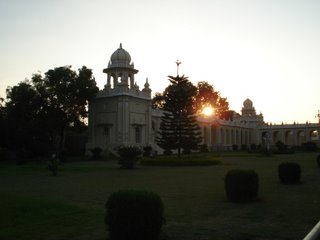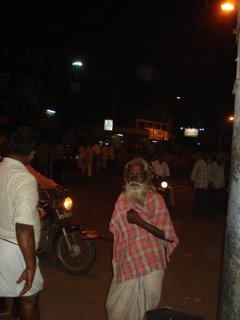 Once upon a time in Mysore there lived a Maharajah. He was immensely
Once upon a time in Mysore there lived a Maharajah. He was immenselywealthy and lived in a magnificent palace, with golden domes, floors
of inlaid marble, doors of carved silver and wonderful glass ceilings
engraved with peacocks. Once a year he allowed his people to marvel at
his splendour when he emerged for a "Darshan" festival, riding the
royal elephant in a golden howdah encrusted with jewels.
When his people saw him, the climax of a procession of guards and
bearers, of local dignitories and minor royals on lesser elephants, -
when they saw him they knew that truly their Maharajah was one of the
gods.
Once upon a time in Mysore there lived a Maharajah. Though he ruled
over thousands who struggled from day to day in abject poverty, he
would sometimes steal out of the palace at nightfall, disguised as an
ordinary man, to check that all was well in his city. Or perhaps he
didn't, but since people believed that he did, the effect was just as
good.
Once upon a time in Mysore, there lived a Maharajah, and at his gate
there was a beggarman, scavenging with the packs of stray dogs for
scraps from the royal table.
Years passed, and a new country was born, a country so vast that the
state the Maharajah ruled was only a fraction of the whole. As the new
country came to birth, many old things passed away. Soon there was no
Maharajah to ride on an elephant and receive the homage of the crowds.
The people were ruled by men from far away, who seldom visited to see
that all was well with them.
The palace that had glittered with the light of a thousand lamps stood
empty and quiet.
But at the gate, sixty years on, the beggarman, or his son's son,
remains.
 His daily routine is constant no matter who governs, for this
His daily routine is constant no matter who governs, for thisis India and turn where you will, the poor are always with you,
scavenging with the dogs for scraps from the rich man's table.
I'm assured by my hosts that today nobody needs to beg. There is land
set aside for "beggar colonies", where the poorest of the poor can
grow the staples of life, and receive a government stipend if they are
unfit for work.
Beggars remain, say my friends, because "It's easy money..." and, I
would guess, because for generations their caste has existed without
any self respect, believing that they have no value, no dignity to
lose.
Mahrajahs may come and go, and so may British tourists, but until the
caste system is excised from the mind of India, there will always be
a beggarman at the gate.
No comments:
Post a Comment